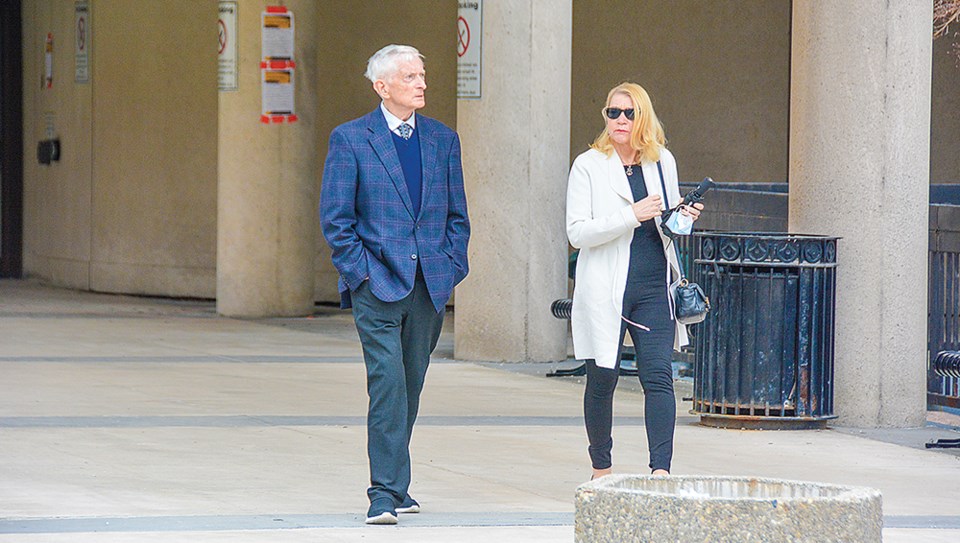Convicted of sexual assault in January, disgraced ex-doctor sentenced to 15 months' incarceration
Expectations were upended on Friday, June 3. Some onlookers of the Charles Duncan trial expected him to be sentenced to no more than house arrest. They were wrong.
In a lengthy decision delivered to those assembled in courtroom six at the Robert S.K. Welch Courthouse in downtown St. Catharines on Friday morning, Justice Deborah Calderwood handed down a sentence of 15 months incarceration, and three years probation for the ex-family physician.
RELATED: Victims, former patients, react to Duncan sentence
Terms of the probation included no contact with the five victims whose cases ended up being prosecuted, and counselling as assigned by Duncan’s parole officer. In addition, the former physician must submit a DNA sample, and comply with sex offender registration.
Calderwood specified that the period of incarceration should be served at a correctional facility that is not a federal penitentiary. At the conclusion of the hearing, Duncan was immediately taken into custody.
Duncan was found guilty on January 21 by Justice Calderwood on all six counts of sexual assault under Section 271 of the Criminal Code, in relation to five different complainants. The charges stemmed from acts committed by Duncan in his medical practice and elsewhere between January 1 and October 31 of 1999; November 27, 2000; June 23, 2009; June 30, 2009; September 25, 2016; and from September 1 to September 30 of 2018.

Sentencing submissions were previously presented by defence counsel Seth Weinstein, and Crown prosecutor Todd Morris.
Duncan, who practiced family medicine in Pelham for decades, resigned from the College of Physicians and Surgeons of Ontario in October 2019, and was required to give up his license to practice medicine, after the College commenced an investigation into allegations against him of professional misconduct and incompetence.
After one of the alleged sexual assault victims told her story to the Voice that autumn, several other women came forward with similar allegations. Duncan was formally charged with seven counts of sexual assault and one of sexual exploitation, and was arrested by Niagara Regional Police in November 2019. The women involved were aged 16 to 64 at the time of the incidents.
Her Honour reiterated that a publication ban prohibited the publication of any information that could identify the named complainants in the case.
During the trial, some 50 letters of support for Duncan were entered from family members, former patients, staff, and medical colleagues. Duncan had no prior criminal history, and previously had an unblemished record with the College of Physicians and Surgeons of Ontario.
Defence counsel Weinstein had argued that a Conditional Sentence Order (CSO) was appropriate in Duncan’s case, and had recommended 18 months of non-custodial house arrest. He suggested that Duncan’s crimes were on “the lower end of the spectrum” with regard to sexual assault, involving mainly inappropriate touching, and insisted that Duncan’s age (he will be 79 in July) and poor health (he has been diagnosed with leukemia and prostate cancer, and is receiving treatment for both) deserve consideration.
This was not an isolated lapse of judgement. Only a real jail sentence will send the appropriate message.
This position was contested by Morris for the Crown, who insisted that a period of incarceration of two to four years was a more fitting sentence. Morris noted that the crimes represented a significant breach of trust, involved multiple victims over a lengthy period spanning two decades. He sought a sentence “proportional to the gravity of the offence.”
Duncan had previously declined an opportunity to address the court.
Justice Calderwood, in her address, stressed that her focus was on a sentence that was appropriate and personalized—“There is no mathematical formula to be applied,”she said—and cited numerous court cases to buttress her decision. It was clear that Calderwood intended to send a strong message of denunciation to healthcare professionals who breach the trust implicit in their codes of ethics.
Victim impact statements appeared to have had a compelling influence. Calderwood recounted for the court the feelings of shame, embarrassment, anxiety, and depression felt by the women, some who related that their personal relationships have suffered, and that they have ongoing problems trusting others, and receiving affection.
“Charles Duncan took advantage of his patients’ vulnerability,” said Calderwood. “The power imbalance weighed heavily in his favour, and he used it to the detriment of his victims.”
Mitigating factors included Duncan’s poor health and advanced age, continued support from his family, and the many positive references to his expertise and care as a family physician over the decades.
Aggravating factors, said Calderwood, included his breach of trust, the intense negative impact of his actions on the victims (one who was a minor), and his apparent lack of contrition.
“He never gained insight into the harm he had caused,” said Calderwood. “Damage was caused the moment the victim’s trust was breached.”
Calderwood also noted that the charges stemmed from actions which occurred over almost two decades.
“This was not an isolated lapse of judgement. Only a real jail sentence will send the appropriate message.”
This is a breaking story. Look for additional details in next week’s edition of the Voice.




